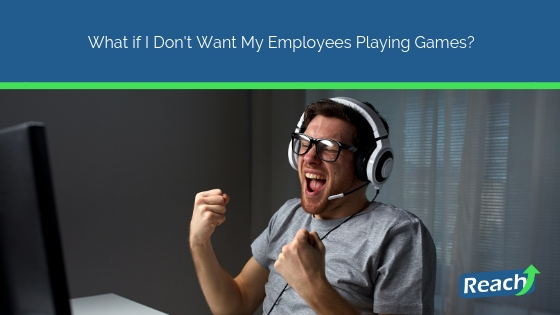What if I Don’t Want My Employees Playing Games?

At first, the idea of introducing games to the work environment of your business may seem counter-productive. After all, traditionally, “games” are synonymous with fun, amusement, and passing time— none of which seem necessary in a business setting.
But what if there was a way for games to support your internal training programs, and actually improve how productive your team members are?
You may be surprised to learn how much data there is that confirms how valuable serious gaming can be for employers who want to increase information retention amongst their employees and better prepare them to excel in their roles.
In fact, Rowan Companies, an offshore drilling services provider, used serious gaming to help their employees apply new situational leadership skills. The company reported that the average participant demonstrated one level of improvement in his or her situational leadership abilities after just 40 minutes of practice.
Additionally, according to a 2011 study by Tracy Sitzmann, games are one of the most effective ways for us to learn when compared to traditional forms of education. They increase learner confidence by 20 percent, improve knowledge by 11 percent and enhance knowledge retention by nearly 90 percent.
With statistics like these demonstrating the value game-based learning brings to businesses and organizations, more and more companies are taking the plunge, willing to give the method a try in order to experience the advantages of learning through games for themselves.
To be more specific, the serious games market is expected to grow from 3.2 billion U.S. dollars in 2017 to 8.1 billion in 2022, demonstrating just how much businesses and corporations are investing in this new, substantiated approach to training employees.
So, if you are concerned that making game-based learning available to your employees will negatively impact productivity, here are some things to remember:
- GAMIFICATION IS VERSATILE
It is a common misconception that gamification (the process of integrating game mechanics into trainingto increase participation, engagement, and retention) is limited to entry-level elements such as points, badges, and leaderboards.
And while these elements are certainly helpful in the right circumstances, gamification can be implemented in a host of other dynamic and beneficial ways.
Whether it’s providing your employees with more practice opportunities, integrating immediate event feedback loops, providing executive challenges,, there are a ton of options to choose from, and each comes with its own advantages.
- SIMULATION LEARNING IS HIGHLY EFFECTIVE
One of the greatest features serious gaming offers is the ability to incorporate simulations directly within the learning pathways of your mobile training app.
Simulations are proven to improve educational outcomes. In fact, in simulation-based team training for obstetric clinicians, 30 percent of participants said their team’s overall performance showed significant improvement and 90 percent agreed that their response to critical events improved.
When your employees are faced with simulation-based exercises, they are exposed to all the benefits of experiential learning, including:
- Improved problem-solving skills
- Demonstrable mindset changes
- Increased engagement levels
- Improved oral and written expression
- Enhanced critical thinking
And much more.
Thus, the advantages of investing in simulation learning exercises for your employees far outweigh the possibility that they may be distracted. After all, gamified learning apps aren’t regular games. They are designed and developed with your desired educational outcomes and strategic aims in mind.
- YOU CAN CONTROL WHEN (AND HOW LONG) YOUR EMPLOYEES USE THEIR GAME-BASED LEARNING APP
When we tell our clients that they can set a time limit for their serious game so that employees can only access it for a certain period of time each day, we see a lot of surprised reactions. But it’s true!
This can help employers restrict use of their training app to break times, or a predetermined daily time limit, which reduces the likelihood of employees using the app when they should be completing other tasks.
Additionally, one of the most significant benefits of mobile game-based learning apps is that employees can access them from anywhere, as long as they have their cell phone.
As a result, they can complete their gamified learning modules from home, during their morning bus commute, or while vacationing in Tahiti. The choice is up to them!
When you combine all of the advantages of learning through games, and consider how cost-effective it is to use a mobile app for training employees, it becomes much clearer that the pros outweigh the cons.
The idea that Game-based learning apps are a distraction is misguided. The truth is that this modern and innovative approach to learning can actually help your employees concentrate more on the tasks they are responsible for, and boost their performance as they become more knowledgeable and confident in their skills.
Interested in learning more about Reach? Book a demo today.
